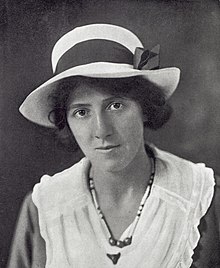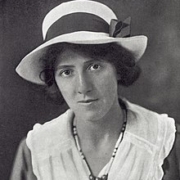Marie Stopes: history erases ugly facts to create a mythical feminist hero
 For some, the name Marie Stopes speaks of one of the biggest abortion providers in the world. For others, it speaks of a person, a feminist icon and pioneer for birth control and family planning.
For some, the name Marie Stopes speaks of one of the biggest abortion providers in the world. For others, it speaks of a person, a feminist icon and pioneer for birth control and family planning.
Both are true, but few people know about Marie Stopes the woman, the author, palaeobotanist, family planning pioneer, and eugenicist. It is Marie Stopes the woman that I focus on here because she is key to understanding the Marie Stopes organisation of today.
Marie Stopes is widely lauded today as a feminist hero and women’s rights campaigner.
The BBC history page dedicated to Marie Stopes describes her as a: ‘campaigner for women’s rights and a pioneer in the field of family planning’ and says nothing negative about her. A biography on the Manchester University website describes her as: ‘…truly an extraordinary woman. Despite the hardships she had faced from her opponents, she continued to pursue the causes she believed in, and remains to this day as a much loved and respected figure. In honour of her name the charity Marie Stopes International [was] established in the 1970s.’ Readers of The Guardian voted Stopes as Woman of the Millennium in 1999. In 2008 she was chosen by an all-female, all-feminist committee to be one of six women pioneers in the Royal Mail’s Women of Distinction collection.
The organisation named after her, Marie Stopes International (MSI) is clearly proud of their link to her, with their website making clear that their present work is built on her legacy:
‘The way we provide contraception and safe abortion services has been shaped, to a large extent, by our history. And by the lives of two pioneers of the family planning movement, Dr Marie Stopes and Dr Tim Black. Both built reputations for their client-centred approach and their willingness to push boundaries – qualities that are central to how we work today.’
However, both the MSI website, the BBC historical figures page dedicated to Stopes, and many other biographies leave a great deal of interesting information out. In particular, her openly racist and eugenic beliefs and practices have been largely overlooked and ignored or, at best, framed as an embarrassing footnote to her achievements.
Here are some less well-known facts about Marie Stopes and her beliefs:
- From 1918 to the early 1930s she published several books on marriage and birth control. One of these was Radiant Motherhood (1920) and in a chapter headed ‘A new and irradiated race’ Stopes reveals her underlying (and repulsive) agenda behind her push for widespread birth control: ‘it is the urgent duty of the community to make parenthood impossible for those whose mental and physical conditions are such that there is a certainty that their offspring must be physically and mentally tainted…’ She wants their sterilisation made immediate and made compulsory otherwise there will be an: ‘…ever increasing stock of degenerate, feeble-minded and unbalanced who will devastate social customs…like the parasite upon a healthy tree.’
- She did not just write, but actively lobbied the Prime Minister and Parliament to pass Acts to enforce compulsory sterilisation in order to: ‘…ensure the sterility of the hopelessly rotten and racially diseased…by the elimination of wasteful lives.’
- Stopes also urged the National Birth Rate Commission to support the compulsory sterilisation of parents who were diseased, prone to drunkenness or of ‘bad character’. To use a selection of her words, the: ‘hopelessly bad cases, bad through inherent disease, or drunkenness or character’, ’wastrels, the diseased…the miserable [and] the criminal’, ’degenerate, feeble minded and unbalanced’, ’parasites’, and the ‘insane’. In Wise Parenthood she explains: ‘Our race is weakened by an appallingly high percentage of unfit weaklings and diseased individuals.’
- Marie Stopes’ first family planning clinic was in North London in 1921 and was run by an organisation she founded: The Society for Constructive Birth Control and Racial Progress. It was no coincidence that her birth control clinics were clustered in deprived areas, to focus on reducing the birth rate of the poor lower classes and prevent the birth of those whom she considered to be ‘the inferior, the depraved, and the feeble-minded’.
- Her views were not a passing fad. In 1934 she publicly stated that ‘the half-caste’ should be sterilised at birth. In 1956, two years before she died, Marie Stopes asserted that one-third of British men should be forcibly sterilised, ‘starting with the ugly and unfit’.
- Stopes cut her own son out of her will simply because he married a girl who wore glasses. Instead, the bulk of her estate went to the Eugenics Society.
- Stopes was a Nazi supporter. In 1935, she attended a Nazi Congress for Population Science in Berlin. Four years later she sent Hitlera gushing personal letter along with a volume of her love poems: ‘Dear Herr Hitler, love is the greatest thing in the world: so will you accept from me these that you may allow the young people of your nation to have them?‘ A poem of hers from 1942, at the height of the Jewish Holocaust, has this to say: ‘Catholics and Prussians, The Jews and the Russians, All are a curse, Or something worse…’ The irony of people today praising Stopes is captured by Anthony Ozimic of SPUC: ‘Praising Marie Stopes as a woman of distinction should be as unacceptable as praising Adolf Hitler as a great leader. Both promoted compulsory sterilisation and the elimination of society’s most vulnerable members to achieve what they called racial progress.’
- The BBC website states that the Catholic Church was Stope’s fiercest critic. They fail to clarify it was actually the Catholic Church that most opposed her appalling eugenic beliefs. In the 1920s, a legal victory against the rising eugenic tide was won by Dr Sutherland, with the support of the Catholic church, over Marie Stopes. Sutherland actually opposed eugenics long before he became a Catholic. Yet Stopes is lauded today as a feminist hero, while the story of the eugenics libel trial, and the Catholic role in trying to stop eugenics, has been either overlooked or dismissed as simplistic Catholic opposition to contraception.
- Moreover, Dr Sutherland and others were actively trying to prevent and cure tuberculosis, (the disease of poverty) while at the same time influential eugenicists decried their efforts as a waste of time. Eugenicists considered tuberculosis was a ‘friend of the race’ because it was a natural check on the ‘unfit’ and poor, killing them before they could reproduce.
How ironic that Stopes, who describes poor children as ‘puny-faced, gaunt, blotchy, ill-balanced, feeble, ungainly, withered’ is the one now feted as a feminist heroine, and Sutherland who tried to treat and heal them is forgotten. - The deliberate excision of Stopes’ eugenic legacy has made her a secular saint. The abortion industry in particular, and liberalism in general, have effectively erased Stopes’ racism and hatred of the poor (such inconvenient historical facts) from their collective memory. Yet the truth is, Marie Stopes was not motivated by a kind of early feminism but rather ‘by the urge to reduce the numbers of the ‘burgeoning lumpenproletariat.’
Stopes and other eugenicists endorsed legalised birth control because the working class was too ‘drunken and ignorant’ to be trusted to keep its own numbers down.
This all helps to explain why today, Marie Stopes International, arguably the biggest abortion and birth control provider in the world, focuses on providing cheap abortions in developing countries directly to the poorest women in the world.
Recall, as I quoted above, the MSI website: ‘The way we provide contraception and safe abortion services has been shaped, to a large extent, by our history. And by the lives of two pioneers of the family planning movement, Dr Marie Stopes and Dr Tim Black.’
I agree with them: Marie Stopes’ eugenic and racist goals in family planning shape MSI even today:
- MSI focus much of their abortion provision in developing countries;
- Western Governments (including the UK) work through MSI to put heavy political pressure on African governments to overturn restrictive abortion policies (see here too) (the ‘West knows best’) but deliberately hides this foreign influence;
- MSI funding is from rich Western individuals and nations, including the UK government, with millions more in tax money pledged in 2019:
- MSI use misnomers such as ‘safe abortion provision’, hiding or ignoring evidence that their policies can actually harm women or at best are ‘ambivalent in effectiveness’.
- The UK Government (funding MSI) spends more money and effort on birth control than on providing quality maternal care (which would save more lives)
The truth is, liberal abortion legislation and ‘safe abortion’ provision in developing countries has no effect on maternal mortality rates ie. women’s health (note, an attempt to discredit these findings had to be retracted!). Liberalising abortion laws increases numbers of abortions but what genuinely improves maternal mortality rates and health and thus truly helps women (and their unborn children) is education, nutrition, clean water, sanitation and maternal health care for women.
It seems that a neo-colonial and eugenic agenda carries on, with a different cloak and mantle and exported to a different part of the world, but with the same underlying agenda that Marie Stopes had. ‘History repeats itself, but in such cunning disguise that we never detect the resemblance until the damage is done.’



Leave a Reply
Want to join the discussion?Feel free to contribute!